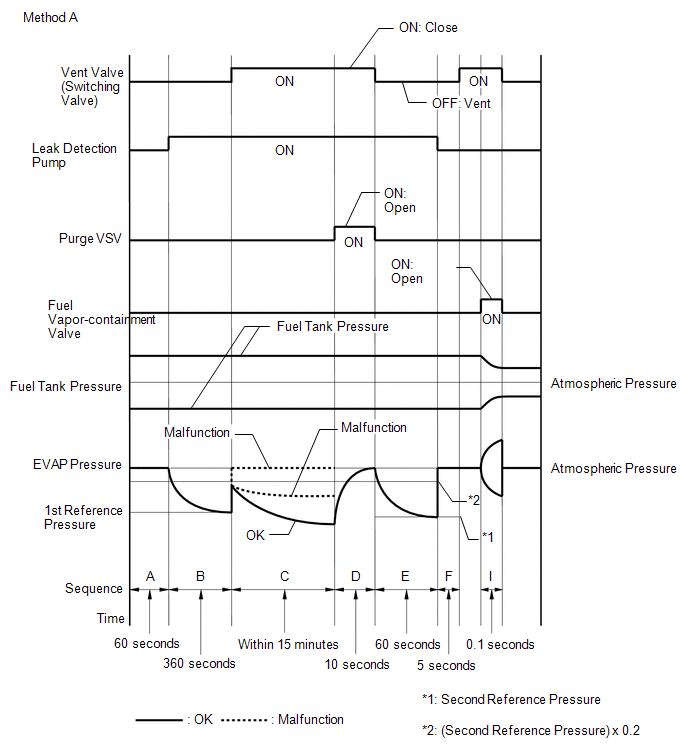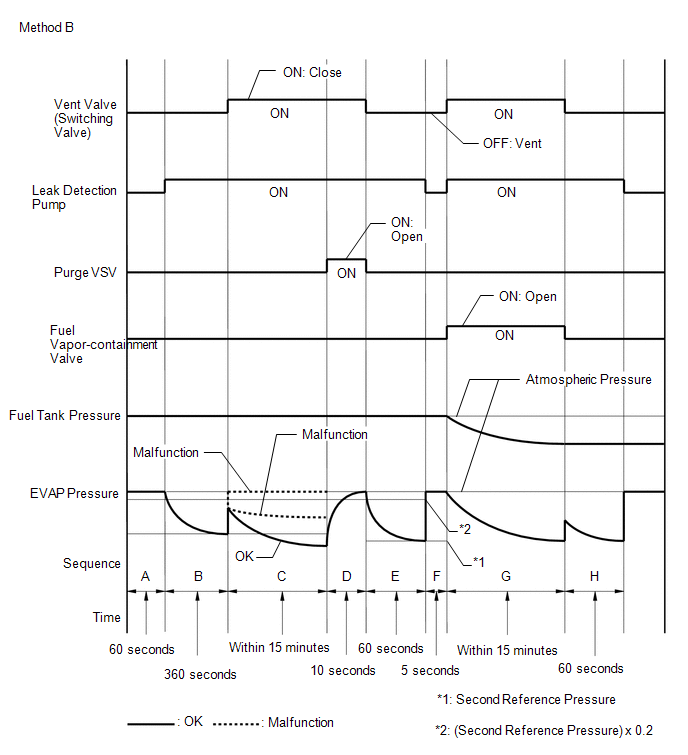Toyota Corolla Cross: Evaporative Emission Canister (Small Leak) (P142000,P142100)
DTC SUMMARY
|
DTC No. | Detection Item |
DTC Detection Condition | Trouble Area |
MIL | Note |
|---|---|---|---|---|---|
|
P142000 | Evaporative Emission Canister (Small Leak) |
Leak detection pump creates negative pressure (vacuum) in EVAP system and EVAP system pressure is measured. Reference pressure is measured at the start and at the end of leak check. If stabilized pressure is higher than second reference pressure, ECM determines that EVAP system has a small leak. |
| Comes on |
|
| P142100 |
Evaporative Emission Canister (Gross Leak) |
Leak detection pump creates negative pressure (vacuum) in EVAP system and EVAP system pressure is measured. Reference pressure is measured at the start and at the end of leak check. If stabilized pressure is higher than [second reference pressure x 0.2], ECM determines that EVAP system has a large leak. |
| Comes on |
|
|
DTC No. | Monitoring Item |
Detection Timing | Detection Logic |
SAE Code |
|---|---|---|---|---|
| P142000 |
Canister small leak | EVAP monitoring (Ignition switch off) |
2 trip | P1420 |
|
P142100 | Canister gross leak |
P1421 |
DESCRIPTION
Refer to EVAP (evaporative emission) System.
Click here
.gif)
MONITOR DESCRIPTION
- P142000: EVAP (evaporative emission) small leak
In operation C, the leak detection pump creates negative pressure (vacuum) in the EVAP system and the EVAP system pressure is measured. If the stabilized system pressure is higher than the second reference pressure, the ECM determines that the EVAP system has a small leak, illuminates the MIL and stores the DTC (2 trip detection logic).
- P142100: EVAP gross leak
In operation C, the leak detection pump creates negative pressure (vacuum) in the EVAP system and the EVAP system pressure is measured. If the stabilized system pressure is higher than [second reference pressure x 0.2] (near atmospheric pressure), the ECM determines that the EVAP system has a large leak, illuminates the MIL and stores the DTC (2 trip detection logic).


MONITOR STRATEGY
|
Required Sensors/Components (Main) | Purge VSV Canister pump module |
| Required Sensors/Components (Related) |
- |
| Frequency of Operation |
Once per driving cycle |
| Duration |
Within 20 minutes |
| MIL Operation |
2 driving cycles |
| Sequence of Operation |
None |
TYPICAL ENABLING CONDITIONS
|
Key-off monitor runs when all of the following conditions are met |
- |
| Atmospheric pressure |
70 kPa(abs) [10.2 psi(abs)] or higher, and less than 110 kPa(abs) [16 psi(abs)] |
|
Auxiliary battery voltage |
10.5 V or higher |
|
Vehicle speed | Less than 4 km/h (2.5 mph) |
|
Ignition switch | Off |
|
Engine condition | Not running |
|
Key-OFF duration | 5, 7 or 9.5 hours |
|
Pressure sensor of canister pump module malfunction (P0451, P0452, P0453) |
Not detected |
|
Fuel tank pressure sensor malfunction (P1451, P1452, P1453) |
Not detected |
|
Purge VSV | Not operated by scan tool |
|
Vent valve | Not operated by scan tool |
|
Fuel vapor-containment valve |
Not operated by scan tool |
|
Leak detection pump | Not operated by scan tool |
|
Purge flow before key-OFF |
Performed |
| Engine coolant temperature |
4.4°C (39.9°F) or higher, and less than 35°C (95°F) |
|
Intake air temperature |
4.4°C (39.9°F) or higher, and less than 35°C (95°F) |
TYPICAL MALFUNCTION THRESHOLDS
P1420: EVAP Small Leak|
EVAP pressure when vacuum introduction for canister was complete |
Between conditions 1 and 2 |
| Condition 1 |
Higher than second reference pressure |
|
Condition 2 | Lower than [second reference pressure x 0.2] |
|
EVAP pressure when vacuum introduction for canister was complete |
Higher than [second reference pressure x 0.2] |
MONITOR RESULT
Refer to EVAP system.
Click here .gif)
CONFIRMATION DRIVING PATTERN
NOTICE:
- The Evaporative System Check (Automatic Mode) consists of 9 steps performed automatically by the GTS. It takes a maximum of approximately 40 minutes.
- Do not perform the Evaporative System Check when the fuel tank is higher than 90% full because the cut-off valve may be closed, making the fuel tank leak check unavailable.
- Do not start the engine during this operation.
- When the temperature of the fuel is 35°C (95°F) or higher, a large amount of vapor will form and any check result will be inaccurate. When performing the Evaporative System Check, keep the fuel temperature less than 35°C (95°F).
HINT:
- After repair has been completed, clear the DTC and then check that the vehicle has returned to normal by performing the following All Readiness check procedure.
Click here
.gif)
- When clearing the permanent DTCs, refer to the "CLEAR PERMANENT DTC" procedure.
Click here
.gif)
- Connect the GTS to the DLC3.
- Turn the ignition switch to ON.
- Turn the GTS on.
- Clear the DTCs (even if no DTCs are stored, perform the clear DTC procedure).
- Turn the ignition switch off and wait for at least 30 seconds.
- Turn the ignition switch to ON [A].
- Turn the GTS on.
- Enter the following menus: Powertrain / Engine / Utility / Evaporative System Check / Automatic Mode [B].
- After the "Evaporative System Check" is completed, check for All Readiness by entering the following menus: Powertrain / Engine / Utility / All Readiness.
- Input the DTC: P142000 or P142100.
- Check the DTC judgment result.
GTS Display
Description
NORMAL
- DTC judgment completed
- System normal
ABNORMAL
- DTC judgment completed
- System abnormal
INCOMPLETE
- DTC judgment not completed
- Perform driving pattern after confirming DTC enabling conditions
HINT:
- If the judgment result is NORMAL, the system is normal.
- If the judgment result is ABNORMAL, the system is malfunctioning.
- [A] to [B]: Normal judgment procedure.
The normal judgment procedure is used to complete DTC judgment and also used when clearing permanent DTCs.
- When clearing the permanent DTCs, do not disconnect the cable from the auxiliary battery terminal or attempt to clear the DTCs during this procedure, as doing so will clear the universal trip and normal judgment histories.
CAUTION / NOTICE / HINT
NOTICE:
- Vehicle Control History may be stored in the hybrid vehicle control ECU assembly if the engine is malfunctioning. Certain vehicle condition information is recorded when Vehicle Control History is stored. Reading the vehicle conditions recorded in both the Freeze Frame Data and Vehicle Control History can be useful for troubleshooting.
Click here
.gif)
(Select Powertrain in Health Check and then check the time stamp data.)
Click here
.gif)
- If any "Engine Malfunction" Vehicle Control History item has been stored in the hybrid vehicle control ECU assembly, make sure to clear it. However, as all Vehicle Control History items are cleared simultaneously, if any Vehicle Control History items other than "Engine Malfunction" are stored, make sure to perform any troubleshooting for them before clearing Vehicle Control History.
Click here
.gif)
PROCEDURE
|
1. | GO TO EVAP SYSTEM |
(a) Refer to EVAP System.
Click here .gif)
| NEXT | .gif) | END |


